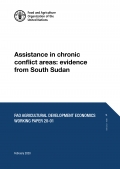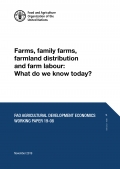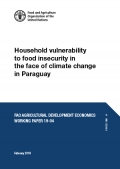Documents de travail de la FAO sur l'économie du développement agricole
About the series (ISSN 2521-1838)
The FAO Agricultural Development Economics Working Paper series, also known as ESA Working Paper series, was created in 2001 and it collects research and policy analysis on agricultural and economic development. The aim of the series is strengthening the capacity of member countries to improve decision-making on food security and nutrition, resilience, climate-smart agriculture, sustainable markets, agribusinesses and rural transformations.
FAO Agricultural Development Economics Working Paper 21-02
Document de travail, 2021
Rising temperatures due to climate change pose a significant threat to agricultural systems and the livelihoods of farmers across the globe. Identifying farm management strategies that reduce sensitivity to high temperatures is, therefore, critical for...
Disponible sur:English
FAO Agricultural Development Economics Working Paper 21-01
Document de travail, 2021
Increased incidences of drought and water scarcity due to climate change is an important challenge facing Sri Lanka’s agricultural sector. Identifying farm practices that can reduce its adverse impacts on agricultural production and farmers’ livelihoods...
Disponible sur:English
Background paper for The State of Food Security and Nutrition in the World 2019 – FAO Agricultural Development Economics Working Paper 19-06
Document de travail, 2020
Despite relatively high economic growth rates in many developing countries in the last two decades, income inequality has remained high and even increased. This has important policy implications as high-income inequality undercuts the benefits of...
Disponible sur:English
Background paper for The State of Food Security and Nutrition in the World 2020 – FAO Agricultural Development Economics Working Paper 20-03
Document de travail, 2020
The health and environmental consequences of our dietary choices impose costs on society that are currently not reflected in the price of those foods or diets that contribute to these detrimental impacts. This paper provides...
Disponible sur:English
FAO Agricultural Development Economics Working Paper 20-02
Document de travail, 2020
The idea that resilience plays a role in mitigating the effects of disaster and climate change is becoming widespread across the development community. As a result, efforts have been made to translate the concept of...
Disponible sur:English
FAO Agricultural Development Economics Working Paper 20-01
Document de travail, 2020
People living in context prone to or affected by conflict suffer from many forms of deprivation. The international community plays a crucial role in strengthening the wellbeing of affected populations, including their food security. Unfortunately,...
Disponible sur:English
FAO Agricultural Development Economics Working Paper 19-08
Document de travail, 2019
A better and more complete understanding of family farms is urgently needed to guide policy makers’ efforts towards achieving a number of Sustainable Development Goals (SDGs). This paper takes stock of the number of farms...
Disponible sur:English
FAO Agricultural Development Economics Working Paper 19-07
Document de travail, 2019
Does receiving information on potential adverse weather conditions induce adaptive responses by smallholders? Do market institutions ease constraints to adaptation of these practices? This report examines these questions using a unique panel dataset of Zambian...
Disponible sur:English
FAO Agricultural Development Economics Working Paper 19-04
Document de travail, 2019
This working paper analyses the effect climate change is expected to have on agricultural productivity, caloric consumption, and vulnerability to food insecurity of household agricultural producers in Paraguay. Our results suggest that increasing temperatures and...
Disponible sur:English
FAO Agricultural Development Economics Working Paper 19-03
Document de travail, 2019
This paper sheds new light on internal migration processes by estimating migration flows for 31 countries, focusing on step migration and on return migration back to rural areas from urban areas. The approach is to...
Disponible sur:English










